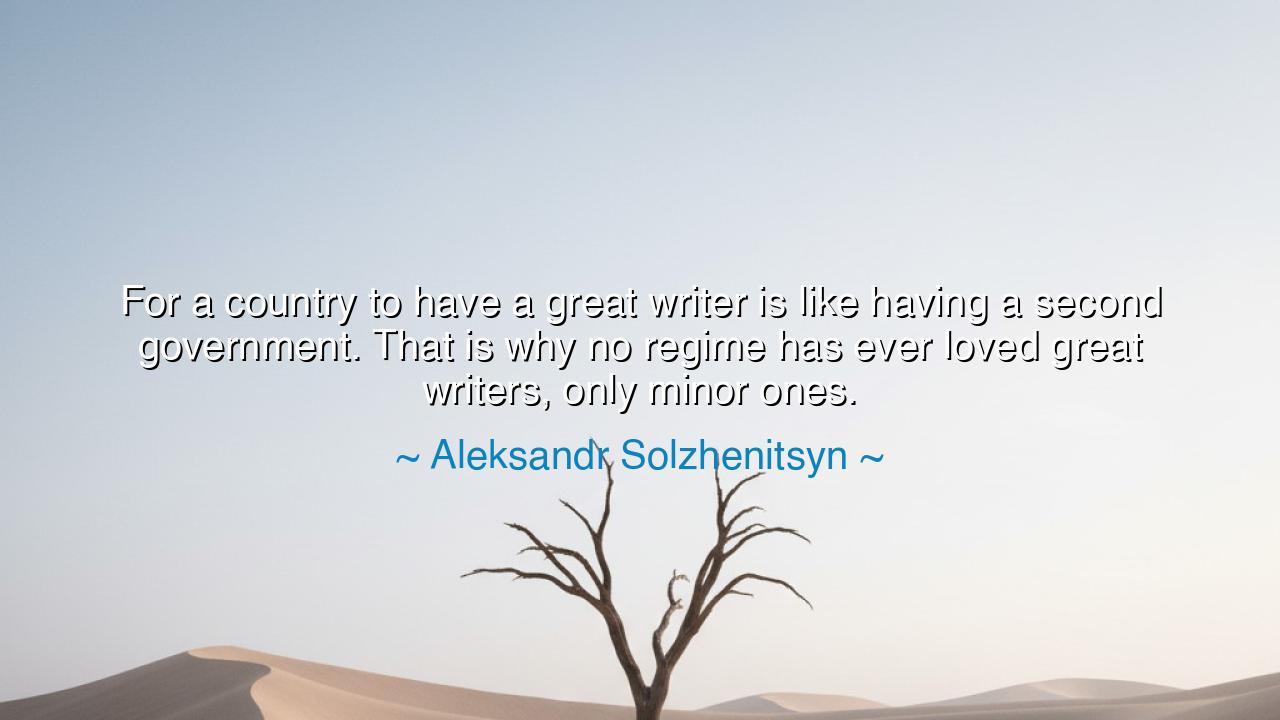
For a country to have a great writer is like having a second
For a country to have a great writer is like having a second government. That is why no regime has ever loved great writers, only minor ones.






The words of Aleksandr Solzhenitsyn — “For a country to have a great writer is like having a second government. That is why no regime has ever loved great writers, only minor ones.” — shine like a torch held aloft in the shadowed corridors of power. In this single thought, Solzhenitsyn reveals a timeless struggle — the eternal conflict between truth and authority, between the voice of conscience and the machinery of control. For he knew, as all true writers know, that words wield a power deeper and more enduring than law or sword. The great writer, by speaking truth unflinchingly, forms a second kind of government — one not of armies or decrees, but of moral influence. And because such a writer governs the hearts of men, every tyrant fears him.
Solzhenitsyn’s words were born from the crucible of his own suffering. A soldier turned prisoner, a loyal citizen turned dissident, he lived under the weight of the Soviet regime, which sought to rule not only the bodies of its people, but their thoughts. When he wrote The Gulag Archipelago, revealing the horrors of the Soviet labor camps, he did what no army could: he exposed the hidden machinery of oppression to the eyes of the world. His pen became a weapon sharper than iron, and his courage, a rebellion mightier than rebellion itself. For that act of truth, he was exiled — proof of his own insight that no regime has ever loved great writers, only minor ones. Governments may tolerate the compliant poet or the flattering historian, but never the one who dares to tell the truth.
The great writer, in Solzhenitsyn’s vision, stands as the conscience of a nation. Where the state commands, he questions. Where the regime enforces silence, he speaks. And where propaganda builds illusion, he reveals reality. The rulers may govern men’s actions, but the writer governs their souls — planting seeds of reflection, defiance, and hope that no law can uproot. Thus, to those in power, a great writer is both a blessing and a threat: a blessing because he enriches the culture, a threat because he cannot be controlled. The “second government” of literature is incorruptible, for it derives not from authority but from truth itself.
History is filled with such examples — voices of conscience defying empires. In ancient Greece, Socrates stood before his judges, condemned not for crime but for awakening thought. The rulers of Athens feared him, for his words stirred young minds to question false virtue. In imperial Russia, Fyodor Dostoevsky was nearly executed for his ideas, yet his writings outlived the Tsars who silenced him. In every age, from the fires of censorship to the gallows of tyranny, the great writer has been treated as a criminal by the very nations he sought to enlighten. For the pen that writes with truth is more dangerous than the sword that conquers by force.
Even in times of freedom, the lesson remains. Governments — even democratic ones — often prefer comfort to criticism, praise to prophecy. The minor writer, who flatters the state or echoes its voice, is rewarded with favor. But the great writer, who reveals its flaws, is met with suspicion. Yet it is the latter who truly serves his country. Solzhenitsyn reminds us that a nation without great writers becomes deaf to its own conscience. For literature is not merely art — it is the mirror of the nation’s soul. A government that silences its writers silences itself.
The power of the writer is not in commanding armies or writing laws, but in shaping thought. His words seep into the minds of generations, teaching courage, empathy, and discernment. A dictator may rule for decades, but a single book can outlast an empire. The truth of the human spirit, once written, cannot be erased by decree. Solzhenitsyn’s own exile proved this — though banished, his words reached across borders, awakening the hearts of millions who had never seen his face. Such is the might of the true writer: he needs no throne, for his kingdom is invisible, yet everlasting.
Let this be the teaching for all who listen: truth is the highest form of service to one’s country. To speak it, even when it wounds, is an act of love, not rebellion. Let no government, however righteous it claims to be, stand above scrutiny. And let no citizen surrender his voice, for the writer lives in every man who dares to question and remember. If power governs the present, then truth governs eternity.
And so, remember Solzhenitsyn’s wisdom: the great writer is the nation’s second government — its moral government. He answers not to kings or parties, but to the eternal laws of conscience. Cherish such voices, protect them, and listen well, for they are the guardians of freedom. When governments fall, their words will remain — shining, unbroken, forever reminding mankind that truth, once spoken, can never again be chained.






AAdministratorAdministrator
Welcome, honored guests. Please leave a comment, we will respond soon